Over the last few weeks, San Jose Inside has given readers a look at some of the top contested races in Santa Clara County. We’ve looked at the five seats up for reelection on the San Jose City Council— District 2, District 4, District 6, District 8 and District 10—and the open county board of supervisors seat.
In the last installment of our series, we move to the 15th State Senate District, where seven people are in the running: former FEC chair Ann Ravel, ex-Assemblywoman Nora Campos, Santa Clara County Supervisor Dave Cortese, San Jose Councilman Johnny Khamis, paratransit driver Tim Gildersleeve, retired Army Staff Sgt. Ken Del Valle and mechanical engineer Robert Howell.
The District
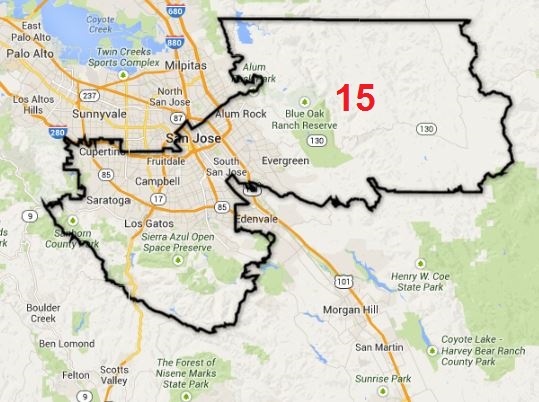
Source: Ballotpedia
District 15 stretches across the northern part of Santa Clara County and includes the Willow Glen, Evergreen and downtown neighborhoods of San Jose as well as the cities of Cupertino, Los Gatos, Campbell, Monte Sereno and Saratoga. To the south, the district touches the Santa Cruz mountains and Stanislaus County.
By recent counts, the district has 498,633 registered voters, according to California voting records. Nearly 48 percent are registered as Democrats, 17 percent as Republicans, 2.3 percent as American Independents and 0.36 percent identify with the Green Party.
The Incumbent
Current District 15 Sen. Jim Beall (D-San Jose) terms out at the end of 2020 after serving 12 years in the state Legislature. Beall hasn’t formally announced his next political venture, but according to the Silicon Valley Business Journal, he may be considering a run for mayor of San Jose when Sam Liccardo’s tenure ends in 2022.
The Contenders
Seventy-year-old Ann Ravel has been a life-long public servant. After receiving her law degree from the University of California, Hastings, she worked for three-plus decades in for the Santa Clara County Counsel, serving as the top attorney from 1998 to 2009.
She went on to work as a deputy assistant attorney general for the U.S. Department of Justice and in 2011, former California Gov. Jerry Brown installed her as chair of the Fair Political Practices Commission. As the ex-overseer of state election law, Ravel proudly touts her role in taking on the Koch brothers’ use of dark money to sway elections.
More recently, Ravel served four years as an Obama appointee to the Federal Elections Commission, which she chaired until her abrupt departure in 2017.
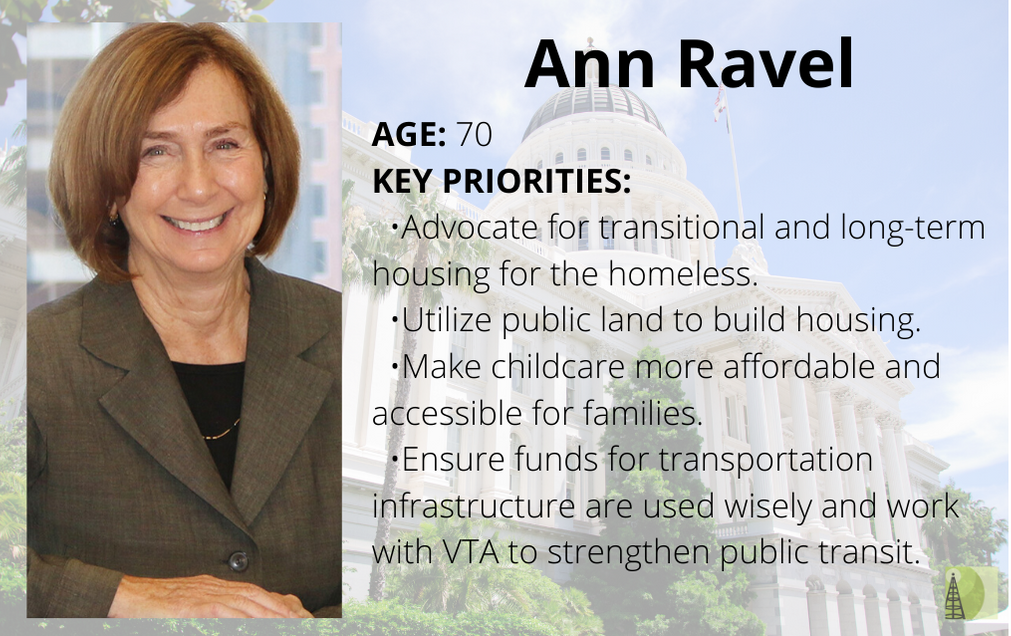
(Graphic by Grace Hase)
Despite her decades of public service, this marks Ravel’s first bid for elected office. She says she’s more of an activist than a politician, citing her involvement in litigation around affirmative action for women in the workplace. Ravel is also currently suing Mountain View-based Google to change its confidentiality agreements and end forced arbitration, according to her campaign bio. She currently lives in Los Gatos with her husband, Stephen, and their Wheaten Terrier, Harpo.
For Ravel, solving the state’s homelessness and affordability crises is at the forefront of her mind. “Having people living on the streets is really a human rights violation,” she says. “It’s shameful that we haven’t done something.”
Following in Beall’s footsteps, Ravel says the state needs to start using its public lands for housing—especially for teachers and the rest of California’s workforce. In order to build homes at a faster rate, she says she wants to streamline the permitting process and task a state agency with overseeing the enforcement of the California Environmental Quality Act (CEQA), which requires a review of the impact a project has on the environment. The law has delayed many affordable housing projects across the state as people bring forward lawsuits unrelated to the environment.
Ravel says she also hopes to bring her experience fighting for campaign finance reform to the state Senate. “I think that money and who gets money is often one of the determinate factors as how people decide what positions to take and that has affected public policy in a way that I think is really inappropriate,” she says.
If elected, Ravel plans to push legislation that would halt the influence of dark money and limit special interest spending on elections.
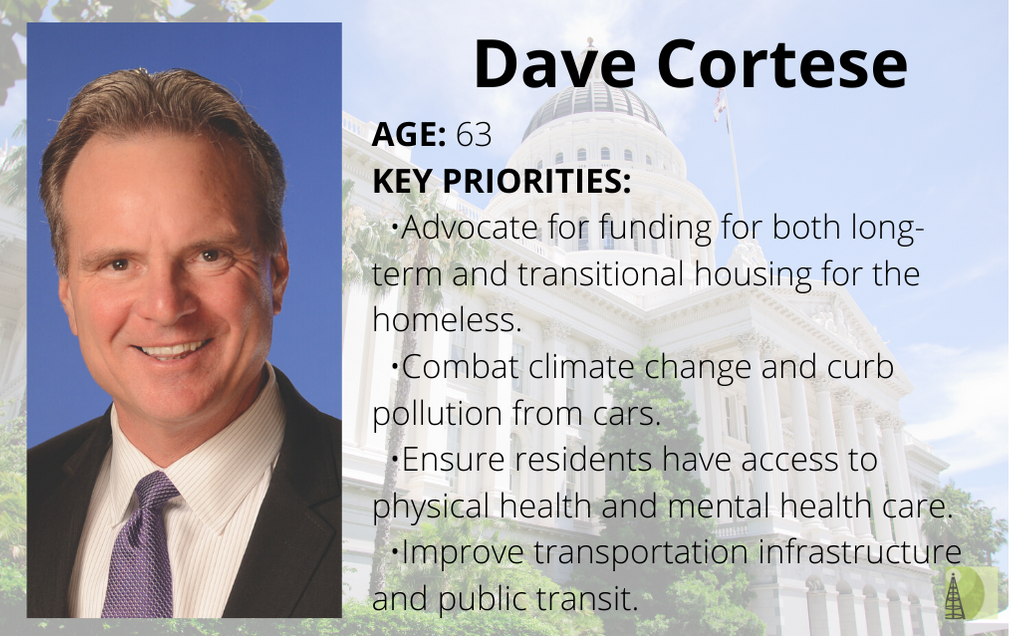
(Graphic by Grace Hase)
Santa Clara County Supervisor Dave Cortese, 63, is an East San Jose native from a long-politically active family. Growing up, his father, Dominic Cortese, served multiple terms on the county Board of Supervisors and in the state Assembly. Cortese went to high school at Bellarmine College Preparatory and eventually earned his law degree from Lincoln University Law School.
Cortese began his own political career in 1992 when he was elected as a trustee for the East Side Union High School District. He served eight years on the board before making a run for the San Jose City Council, where he represented the Evergreen neighborhood until 2008. Since then, he’s served on the county Board of Supervisors.
Over the years, Cortese has also been a member of a number of regional boards and commissions including the Santa Clara Valley Transportation Authority (VTA) Board of Directors, the Metropolitan Transportation Commission and the Association of Bay Area Governments Executive Board.
His wife, Pattie Cortese, is well known in her own right and is currently in her fifth year as a board trustee for the East Side Union High School District. The couple has four children and a chocolate lab named Travis.
Cortese says he’s best qualified to be the next state Senator because of his decades of what he calls “deep immersion” in Santa Clara County.
As a supervisor, he’s made tackling housing and homelessness his “signature” issue, he says, especially as the co-chair of 2016 affordable housing Measure A. “One of the next steps is going to need to be a much greater, much more significant investment at the state level,” Cortese says of making a dent in California’s housing stock and getting people off the streets. The Senate hopeful hopes to build both long-term housing with wrap-around services and interim housing to help the homeless transition into stability.
Over the last decade, Cortese says he made combating climate change a big priority, pushing the county to become an environmental leader in the United States. At a candidate forum last fall, the county supe said he’d like to focus on curbing auto emissions if he’s elected to the state Senate.
“We have to continue to regulate emissions in the state and we have to be a leader among others, not just here, but globally to do the same thing,” he said at the time.“That’s not the posture of the White House right now, but it needs to be the posture here.”
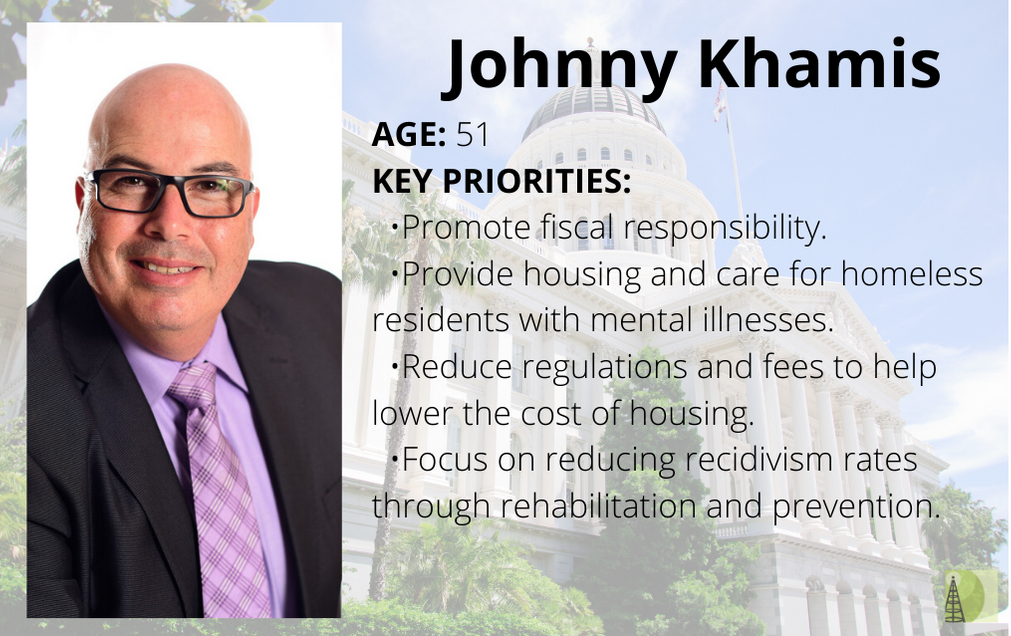
(Graphic by Grace Hase)
Fifty-one-year-old San Jose Councilman Johnny Khamis is making his bid for higher office because he wants to instill a voice of fiscal responsibility in Sacramento. During his nearly eight years on the council where he’s represented Almaden Valley, Khamis has been a self-described “fiscal hawk,” advocating fewer taxes and fees.
Born in Beirut, Lebanon, Khamis and his family moved to San Jose in the 1970s after being granted political asylum from civil war in their homeland. The councilman, who now identifies as an independent, left the Republican party in 2018 due to President Donald Trump’s hardline rhetoric about immigrants.
Growing up, Khamis attended San Jose public schools and earned his degree in business management and communications from San Jose State University. Before being elected to the council, he worked as a financial advisor for nearly two decades, running his own business for some of that time. He and his wife, Juliana, reside in Almaden with their two sons and their black lab, Axel.
Besides ensuring that taxpayer dollars are spent wisely, Khamis says he wants to focus on housing and providing services to people who are homeless and mentally ill. He’s been a vocal supporter of Laura’s Law—which mandates outpatient treatment for those with severe mental illness—and wants to work on expanding the legislation.
“I want to build institutions that will take care of people who cannot take care of themselves,” he says. “A lot of people concentrate on the cost of housing as the biggest problem ... [but] if we’re not addressing drug addiction and mental illness, we’re not addressing a major problem of homelessness.”
Khamis says he’s also concerned with the state of California’s justice system when it comes to recidivism rates, noting that it’s “much easier to get out of jail and harder to get arrested for anything.” If elected, he says he hopes to focus on rehabilitation.
“When we release prisoners, we should make sure that they are assisted and integrated in society rather than leaving [them] on the streets to be homeless and go back into drug addiction,” he says. “A lot of promises were made with Prop. 47 and 57 and I have not seen those promises come to fruition.”
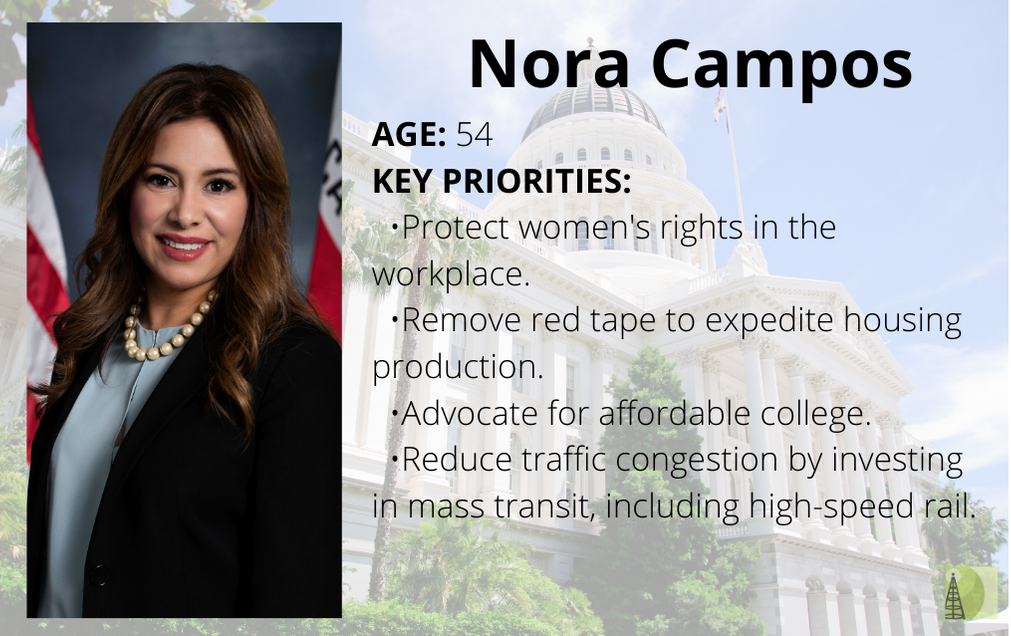
(Graphic by Grace Hase)
Nora Campos, 54, is trying to return to Sacramento after terming out of the state Assembly in 2016. She says she’s the best fit for the job because she knows how to “move policy” in the state’s Capitol, unlike her competitors. The state Senate hopeful cites her parent’s involvement in the farmworker movement, where they marched alongside Cesar Chavez, as her inspiration for becoming a public servant.
After growing up in East San Jose, Campos launched her political career in 2001 when she won a special election to represent the neighborhood on the San Jose City Council. She served 10 years as the District 5 rep until moving onto the state assembly where she spent some time as speaker pro tempore until terming out of her seat in 2016.
Campos’ family is also well known in Silicon Valley. Her brother, Xavier Campos, succeeded her on the city council and her husband, Neil Struthers, is the former CEO of the Santa Clara and San Benito Counties Building and Construction Trades Council. Campos made a run for the District 15 seat four years ago but couldn’t unseat Beall.
Campos has placed issues effecting women and women of color at the forefront of her agenda. She tells SJI that “making sure we are looking at pay equity for women and women of color and gender equity in the workplace,” is one of her top priorities. In the state Assembly, she authored a bill that would have prohibited employers from using old salary data to justify paying women less than their male co-workers. Then-Gov. Brown, however, vetoed it, saying he was unsure it would promote more equitable wages.
Campos also wants to focus on reducing congested roads by investing in mass transit and expanding BART and Caltrain. The former assemblywoman has been a longtime supporter of high-speed rail and wants to ensure that the project connects the Central Valley with jobs to rid workers of two to four hour daily commutes.
“I’ve always been supportive of rail to make sure that we create an infrastructure that really works for the residents here in Silicon Valley but also a rail system that works in California,” she says.

(Graphic by Grace Hase)
Sixty-five-year-old Robert Howell was one of the last contenders to jump into the race. The mechanical equipment manufacturer has been a long time resident of San Jose and attended both De Anza College and San Jose State. Howell is a Republican and describes himself as a fiscal conservative with libertarian views on social issues. His involvement in local politics dates back to 2010, when he founded the local Tea Party chapter.
Howell says his top issue is solving California’s homeless crisis, citing the need to help those on the streets struggling with drug addiction and mental illness.
“As far as I can tell, everybody's missed the mark,” he says. “[We need to] figure out ways to actually try to fix it.”
Howell added that he’s also concerned with the state of California’s public school system and wants to advocate for the usage of vouchers—government-funded coupons that subsidize tuition at non-public schools. “The public schools would get a hell of a lot better if they had some competition,” he says. “What we’re doing is we’re generating a whole generation of kids that can’t read.”
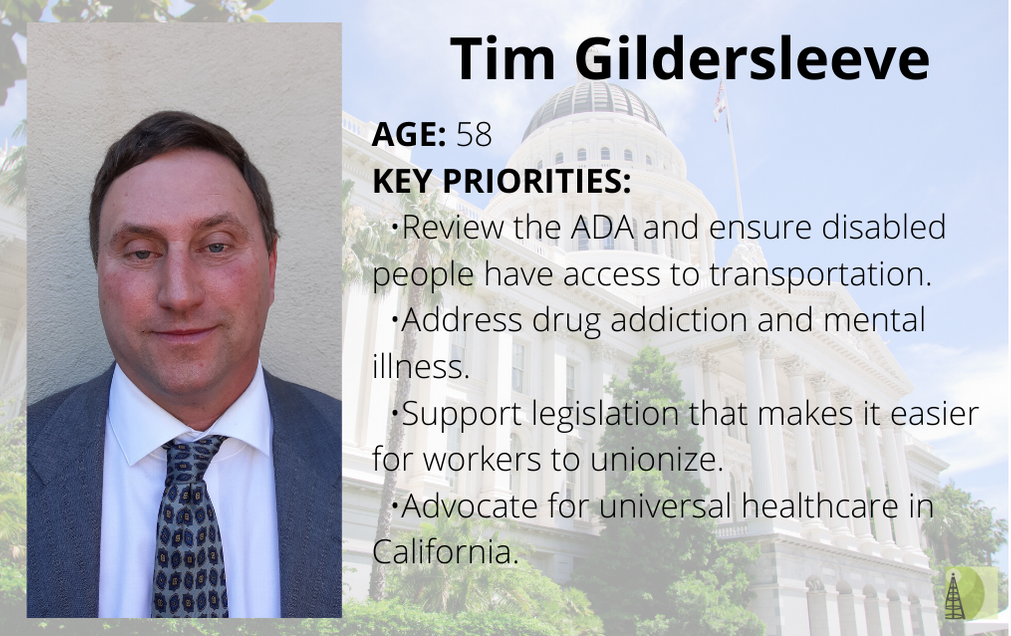
(Graphic by Grace Hase)
Tim Gildersleeve, 58, sees the state Senate seat as a way to expand his service to others. Since 2002, he’s worked as a paratransit driver for a company that contracts with VTA. “This would allow me to broaden that philosophy of helping people out, specifically the poor, elderly and disabled,” he says.
Gildersleeve hails from New Jersey, but moved to San Jose more than three decades ago. He holds a bachelor’s degree in business and an associate’s in computer information systems. Before becoming a paratransit driver, he worked for 11 years at NASA.
While Gildersleeve has no political experience, he’s made numerous bids for both the state Senate and the San Jose City Council. The political aspirant has a ballot designation of independent, but calls himself a “Christocrat”—denoting his following of Jesus Christ.
If elected, Gildersleeve says he wants to focus on tackling California’s housing crisis. He says that the state won’t be able to build its way out and wants to ensure housing is under stricter state control. He also notes that he does not support rent control since it treats the symptoms, not the cause.
“I like the idea of possibly helping people relocate to other states,” he explains. “This is not just a state problem or a regional problem, it’s a national problem.”
Throughout the campaign, Gildersleeve has refused to take donations and says it’s because he wants to be beholden to the voters—not special interests.
“I’m really not for gun control, but if 70 percent of my voters want me to pass something to regulate gun control I will do that even though I don’t necessarily agree with it because that’s what they want,” he said. “The voters are going to be my boss.”
One final candidate—retired Army Staff Sgt. Ken Del Valle—has no campaign website and could not be reached for a candidate interview. According to the Mercury News, he’s a San Jose State University student who spent nearly a decade in the military before going on to found the college’s Turning Point USA chapter.
The Stakes
San Jose State political science professor and CreaTV’s Valley Politics host Terry Christensen says he sees this as a four-way race between Ravel, Cortese, Khamis and Campos. The local politics expert expects Cortese and Campos to split the vote on the east side of the district, while Ravel and Khamis divide the west side.
For state Senate races, the top two vote-getters move on to the general election in November. Christensen predicts that Cortese and Khamis will go head-to-head in the runoff due to their name recognition, heavy campaigning and high visibility.
“It’s really a political science experiment to see someone running as an independent in such a partisan state,” he notes of Khamis.
As for Ravel, Christensen says the former FEC chair has gathered a lot of support, but he’s still unsure of her viability since her main message about anti-corruption and transparency may not stand out to voters more concerned about issues like building housing and ending homelessness. “Everybody likes that, but it’s not what comes out at the top of the list of voter concerns,” he says.
Christensen adds that Campos’ candidacy could hurt both Cortese and Ravel when it comes to the number of votes they receive, as he expects she’ll scoop up support from pro-labor and female voters, respectively.
Previous Coverage
Bail Bonds Boss Raises Campaign Cash for South Bay’s Business-Aligned Candidates
Big Oil, Corporate PAC Money Seep Into State Senate Race
BAYMEC Unveils Endorsements for March Primary Election
Dave Cortese Draws Scrutiny Over Taxpayer-Funded Swag
Former FEC Chair Ann Ravel Swears Off Corporate Cash in 2020 Bid for State Senate
Santa Clara Co. Supervisor Dave Cortese Accused of Violating State’s Political Reform Act
SCC Supervisor Dave Cortese Ruffles Feathers by Lavishing Grants Outside His District
State Senate Candidates Discuss Climate Change, Sanctuary Policy at Forum
State Senate Candidates Sound Off On Transportation, Housing


What’s this “fiscal responsibility” thingy that Khamis is referring to?
Must be a fringe issue since none of the other candidates seem to be aware of it.
California has plenty of money and plenty of taxpayers. Why would anyone even bring it up?